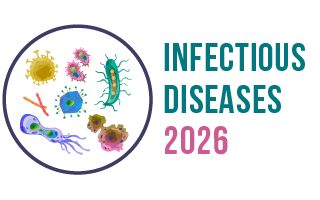4th International Conference on
Infectious Diseases
September 09-10, 2026 | Barcelona, Spain

Address: Avinguda Del Maresme 78 Ronda De Dalt Exit 15, 08940 Comella de Llobregat, Barcelona, Spain
Infectious Diseases 2026

Dokuz Eylul University, Turkey
Abstract:
Laboratory medicine is an essential part of the diagnostic process, supporting clinical decisions, guiding and addressing therapy. The recent COVID-19 pandemic illustrated well the key role of laboratory medicine in the diagnosis, management and prognosis of SARS-CoV-2 infected patients. Technological advances improved the laboratory diagnosis and patients’ management and others appear very promising as clustered regularly interspaced short palindromic repeats (CRISPR) or artificial intelligence (AI). This review describes the current diagnostic assays routinely used in laboratory as well as the novel technologies not in routine yet but that represent future directions and will probably dominate the laboratory in the next years. Serology is important for detecting antibodies and/or antigens of the infectious pathogens or for epidemiological purposes, while real-time PCR with its high sensitivity and specificity has a key role in pathogen detection in different biological matrices and in monitoring the therapy. Nanochip-based technologies make possible delivering a laboratory report at the patient’s bed or in settings where a laboratory-based hospital is not available. Next generation sequencing (NGS) is a massively high throughput parallel sequencing technology that allows the simultaneous sequence of billions of DNA fragments in a short time frame. This technology can be used to detect drug-associated mutations, minority species within an infected patient or for pathogen identification. CRISPR-based technology is a fast and accurate diagnostic method that can be applied to different human diseases including infectious diseases. Artificial intelligence is increasingly used in laboratory medicine. In clinical microbiology, it is used to build up diagnosis analyzing genomic information or mass spectra from isolated bacteria, for predicting antibiotic sensitivity or for processing in a short time a large number of images with meaningful results. Thus, the laboratory is becoming increasingly automated and interwoven with sophisticated software or algorithms that will increase the sensitivity and specificity of diagnoses, besides reducing time to results.
Biography:
Delia Teresa Sponza is currently working as a professor at Dokuz Eylul University, Department of Environmental Engineering. Scientific study topics are; Environmental engineering microbiology, Environmental engineering ecology, Treatment of fluidized bed and activated sludge systems, Nutrient removal, Activated sludge microbiology, Environmental health, Industrial toxicity and toxicity studies, The effect of heavy metals on microorganisms, Treatment of toxic compounds by anaerobic / aerobic sequential processes, Anaerobic treatment of organic chemicals that cause industrial toxicity and wastewater containing them, Anaerobic treatability of wastewater containing dyes, Treatment of antibiotics with anaerobic and aerobic sequential systems, Anaerobic and aerobic treatment of domestic organic wastes with different industrial treatment sludges, Treatment of polyaromatic compounds with bio-surfactants in anaerobic and aerobic environments, Treatment of petrochemical, Textile and olive processing industry wastewater by sonication, Treatment of olive processing industry wastewater with nanoparticles and the toxicity of nanoparticles. She has many international publications with an H index of 43 and 6300 citations.
